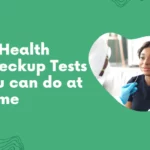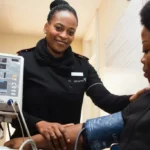Human Immunodeficiency Virus (HIV) is a virus that attacks the body’s immune system, specifically targeting CD4 cells (T cells) which help fight off infections. Over time, untreated HIV destroys these cells, weakening the immune system and making a person vulnerable to various infections and cancers.
If left untreated, HIV can progress to Acquired Immunodeficiency Syndrome (AIDS), the most advanced stage of HIV infection.
HIV is primarily transmitted through contact with specific bodily fluids from an infected person (blood, semen, pre-seminal fluid, rectal fluids, vaginal fluids, breast milk), most commonly via unprotected sex or sharing needles.
While there’s currently no cure, with proper medical care and treatment, HIV can be controlled, allowing people to live long, healthy lives. The crucial first step? Getting an HIV test to know your status.
The Importance of HIV Testing in Nigeria
Knowing your HIV status is empowering. It’s the only definitive way to confirm whether you have the virus. This knowledge allows you:
- To Protect Your Health: If positive, you can start life-saving treatment (antiretroviral therapy or ART) promptly, keeping your immune system strong and preventing progression to AIDS.
- To Protect Your Partner(s): Knowing your status enables you to take precautions (like consistent condom use or PrEP discussions) to prevent transmitting the virus to others. Effective HIV treatment also dramatically reduces the risk of transmission (Undetectable = Untransmittable, U=U).
- Peace of Mind: If negative, testing can alleviate anxieties and reinforce safe practices.
Understanding the importance of HIV testing is vital for individual and public health in Nigeria.
Who Should Get an HIV Test & How Often?
General recommendations suggest:
- Routine Screening: Everyone between the ages of 13 and 64 should get tested for HIV at least once as part of routine healthcare.
- Increased Risk: Get tested at least annually if you:
- Have had unprotected sex (vaginal, anal, or oral).
- Have had sex with multiple partners or anonymous partners.
- Have injected drugs and shared needles or works.
- Have been diagnosed with another STI, Hepatitis, or Tuberculosis (TB).
- Have had sex with someone who falls into any of these categories or whose sexual history you don’t know.
- Pregnancy: All pregnant women should get an HIV test during pregnancy. Early detection allows for steps to prevent transmission to the baby.
- New Relationships: Consider getting tested before starting a new sexual relationship.
Frequency: For those with ongoing risk factors, more frequent testing (e.g., every 3-6 months) may be recommended. Discuss your specific situation with a healthcare provider.
Understanding the HIV Testing Process
Getting an HIV test is typically simple and quick:
- Sample Collection: Most tests require a sample of blood (either from a vein or a finger prick) or sometimes oral fluid (saliva).
- Window Period: It’s important to understand the “window period” – the time between potential HIV exposure and when a test can accurately detect the virus. This varies depending on the type of test (from a few weeks to a few months). If you test negative shortly after a potential exposure, retesting after the window period (usually around 3 months for conclusive results with most standard tests) is recommended.
- Results: Rapid tests can provide results in minutes, while lab tests may take a few days.
Where to Get a Confidential HIV Test in Nigeria
Finding a reliable and private place for HIV testing in Nigeria offers several options:
- Government Clinics/Hospitals: Often provide free or low-cost testing but may involve wait times.
- Private Clinics/Labs: Offer testing, potentially with more convenience but at a cost.
- NGOs/Community Health Centres: Many organizations offer dedicated HIV testing and counseling services.
- At-Home HIV Test Services (like Healthtracka): Offer maximum privacy and convenience.
Healthtracka: Your Confidential At-Home HIV Test Solution
Healthtracka provides a discreet, convenient, and reliable option for HIV testing in Nigeria. We understand the importance of privacy and ease of access:
- Order Online: Book your HIV test (or a comprehensive STI panel) easily on our website.
- Confidential At-Home Sampling: A trained medical professional visits your preferred location (home, office) at your chosen time for discreet sample collection (usually blood). No need to visit a clinic or lab. This ensures a truly confidential HIV test experience.
- Secure Digital Results: Receive your results securely via email, typically within 24-48 hours after the lab receives your sample.
- Post-Test Support: If your result is positive, or if you simply want to discuss your results, you can book a consultation with one of our doctors for guidance on next steps, treatment options, and partner notification support.
What if an HIV Test is Positive?
A positive HIV diagnosis is manageable. With today’s effective treatments (ART), people with HIV can live long, healthy lives. If you test positive:
- See a Doctor: Connect with a healthcare provider experienced in HIV care immediately.
- Start Treatment: Begin ART as prescribed. Adherence is key.
- Inform Partners: It’s crucial to inform current and past sexual partners so they can also get tested.
- Seek Support: Connect with support groups or counseling services. You are not alone.
Know Your Status, Take Control
Getting HIV testing in Nigeria is a fundamental step in taking care of your sexual health and overall well-being. Don’t let fear or inconvenience stop you. Knowing your status empowers you to protect yourself and others. With convenient and confidential HIV test options like Healthtracka’s at-home HIV test service available in Nigeria, prioritizing your health is simpler than ever.
Ready to know your status? Book your confidential HIV test conveniently at home with Healthtracka today.




